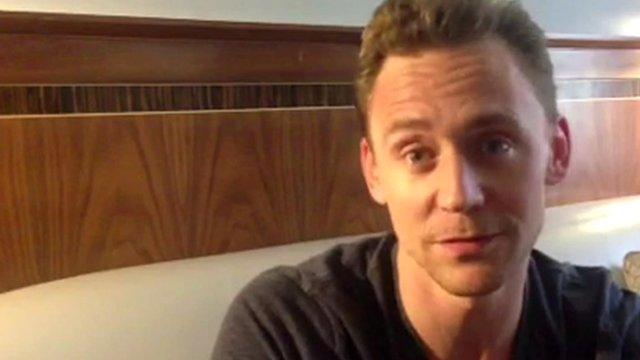Tom Hiddleston 'leans into the darkness' on Crimson Peak
- Published
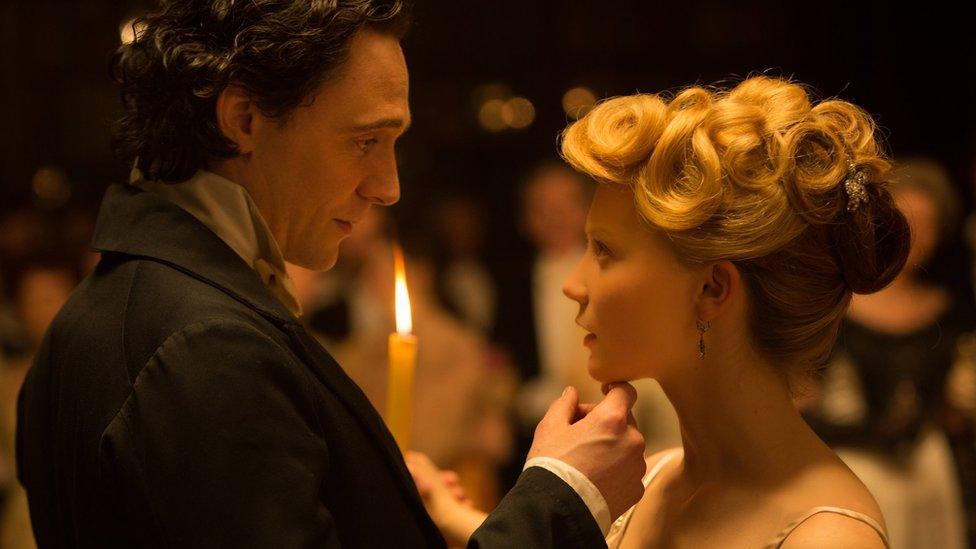
Hiddleston plays the conflicted Sir Thomas Sharpe, who is torn between love and protecting his family's terrible secrets
"I have had friends of mine who are cleverer than me explain the empirical evidence pertaining to the physical impossibility of the supernatural, they just don't exist."
There you have it, Tom Hiddleston, starring in the spooky new gothic horror film Crimson Peak, does not believe in ghosts. To paraphrase a hard-bitten studio advertising executive: "Way to sell the movie, Tom".
Hiddleston goes on: "I should say I did believe in ghosts as a child. I was at an old boarding school in England, and there used to be apocryphal stories that you shouldn't go into the chapel at midnight and all that, and I was as gullible as everyone else."
"But if you are going to tell this story, then Guillermo del Toro is the man, he is the master."
Crimson Peak is the duo's first collaboration and tells the haunting story of a young aspiring American writer - played by Mia Wasikowska - who, after falling for the charms of Hiddleston's Sir Thomas Sharpe is swept off to his family's remote gothic mansion in the Cumbrian hillside.
Also resident in the crumbling mansion, slowing sinking into the blood-red clay mines beneath, is his mysterious elder sister Lady Lucille, played by Jessica Chastain, the protector of her family's dark secrets.
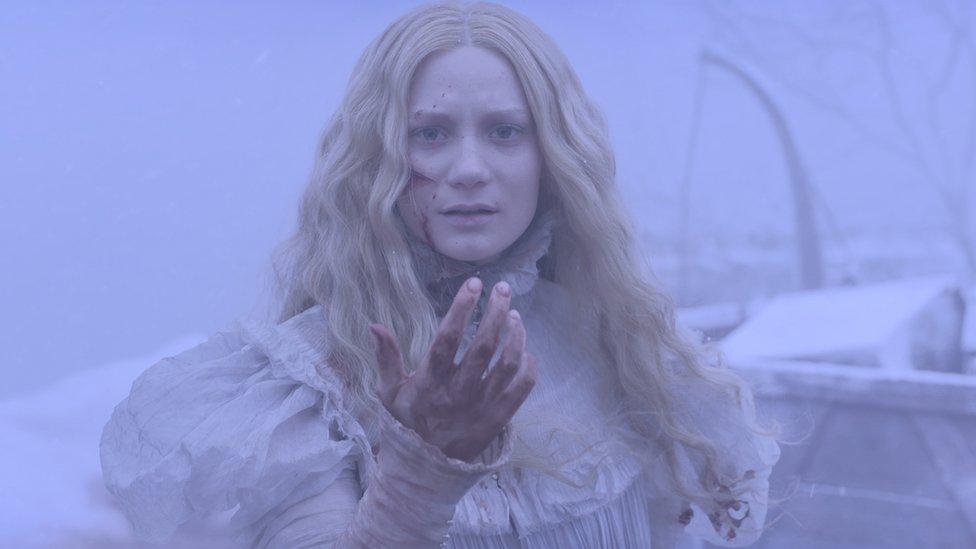
The film's cinematography and production design are lavishly realised
"The way he [Del Toro] blends together sophisticated material with dark adult material that is emotional and complex with the world of supernatural, it was exciting," says Hiddleston.
The film is a return to the type of fantasy horror that made the Mexican director's name more than 20 years ago.
His Spanish-language films such as Cronos and The Devil's Backbone set a high standard, arguably surpassed by his beautiful but chilling fantasy Pan's Labyrinth, set five years after the Spanish Civil War and telling the story of a bookish young stepdaughter of a sadistic army officer who escapes into an eerie fantasy world.
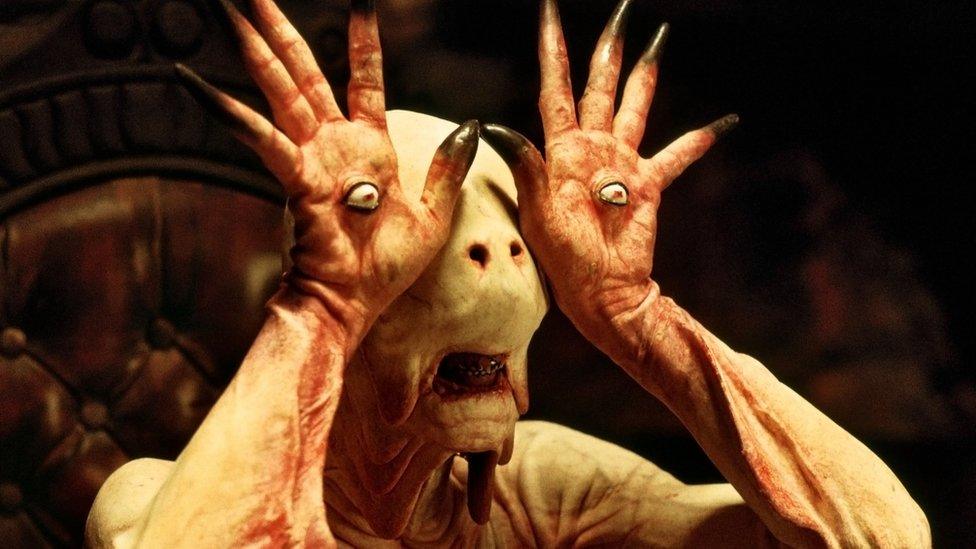
In Pan's Labyrinth, De Toro created monsters such as The Pale Man, which still terrify audiences today
The film was internationally acclaimed and won three Oscars and three Baftas.
Yet with Crimson Peak, Del Toro insists it's about more than just scaring people, though the film has ghosts (several of them), brutal murders and even a haunted house which has red, blood-like clay literally dripping from its cracked and broken walls.
At the centre of the film is a story about love and the forms it can take, whether pure or destructive.
"It's not a horror film, it's a gothic romance, does it mean it's not scary? No, it can be scary and spooky, but it functions as a romance," he says.
Tom Hiddleston: I'm scared of my own imagination
"The theme of love was important - to show every character being changed by love. When discussing gothic romance, and I'm paraphrasing here, [19th Century author and critic] Henry James said something like, 'The ghost represents the past or the impossibility for us to move into the future.'"
In the character of Sir Thomas, Hiddleston plays a character who treads on the dark side of human nature.
It's a side he has shown before, most famously as Loki, the villainous brother of Thor in the Marvel series of films.
He has also recently portrayed:
a vampire in Jim Jarmusch's Only Lovers Left Alive
country singer Hank Williams in the forthcoming biopic I Saw The Light
Shakespeare's Coriolanus on stage at the Donmar Warehouse
"I'm not exclusively drawn to dark characters," Hiddleston says. "I had this conversation with Anthony Hopkins, I don't mean to just clunk his name in there, but he played my dad in the Thor films and was once talking about this very thing - the appeal of darkness in cinema."
A keen mimic, he impersonated Robert De Niro, external on the Graham Norton show in front of the bemused movie star himself, Hiddleston continues in Hopkins's lilting tones.
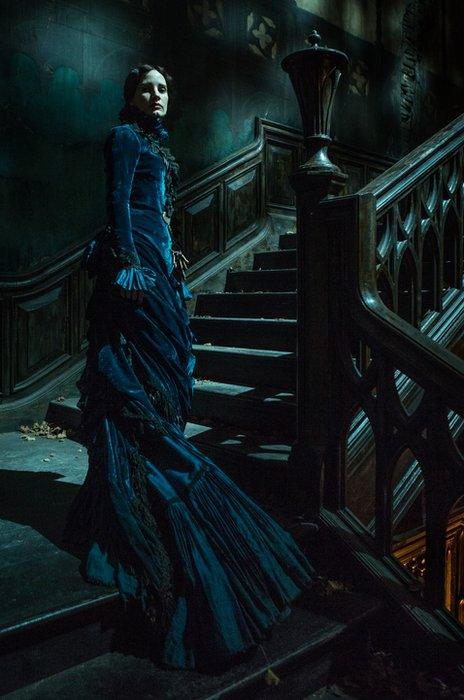
The Sharpe's home Allerdale Hall was built on a massive set at Pinewood Toronto Studios
"He said, 'When people stop me on the street, they only want to ask about one man [Hannibal Lecter from Hopkins's 1991 film Silence of the Lambs].
"'I think people are fascinated by darkness, they want their lives to be filled with love and happiness and friendship and laughter and joy.
"'But what they want on Friday night is to turn the lights out and go into a dark room and see someone lean into the darkness, and they see something and recognise it, but then they switch on the lights and they spill out into the street and have dinner and they do what ever they do and they don't want it in their lives but they want to see it on screen.'"
There is certainly darkness on screen in Crimson Peak, but Hiddleston is quick to point out that Del Toro attempts to give explanations if not excuses for his characters' behaviour.
He says: "Guillermo has compassion for his monsters, he writes his villains from a compassionate place. There's a lot of menace and cruelty about the Sharpe siblings but he tried to explain where that cruelty comes from."
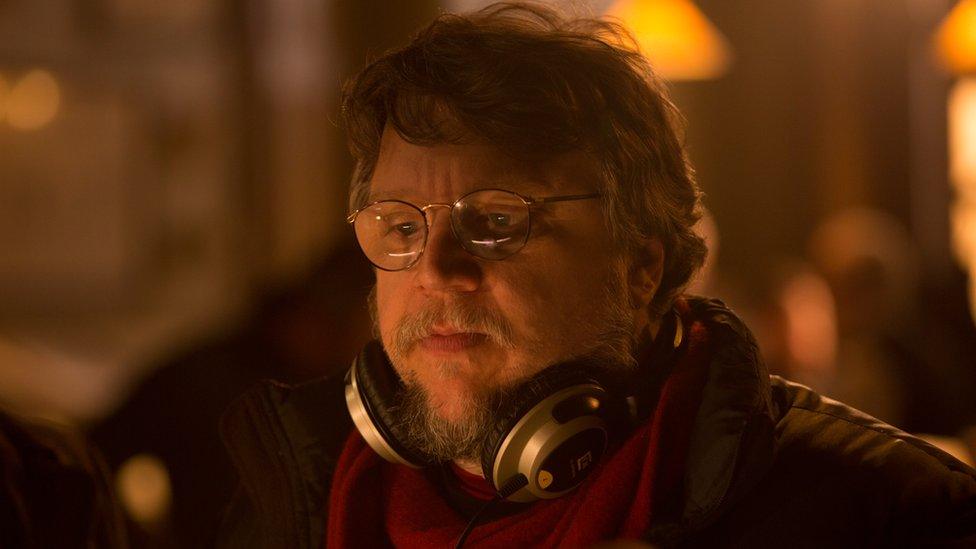
Director Del Toro has returned to the fantasy-horror genre that began his career
However, while Hiddleston may refuse to entertain the possibility of the supernatural, Del Toro sits on the opposing side of the argument and even claims to have experienced two ghostly encounters.
The director says: "Once, scouting locations for The Hobbit in New Zealand, I beguilingly asked for the haunted room, and I was watching a boxed set of The Wire and, in the middle of the night, I heard a horrible murder in the room.
"I tracked the screams to the bathroom and nobody was there, and then I heard a man crying through the vent, which I opened, it led all the way to the cellar, it was very scary. I kept the lights on and finished the Wire box set that night."
But it turns out that, like many of the themes in even his most fantastical of films, his fear is rooted in the mundane.
"What scares me, in real life, is politicians and corporations," he says.
"Those are scariest things for me because they're inhuman in many ways. There are some politicians I'm sure who are OK, but I've just never been familiar with one.
"There's more chance of seeing a ghost."
Crimson Peak is in UK cinemas on Friday.
- Published14 October 2015
